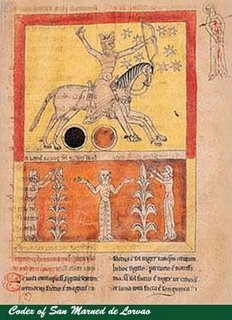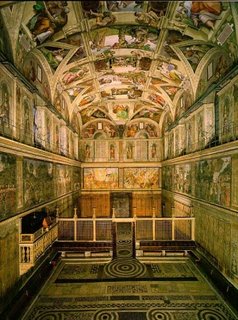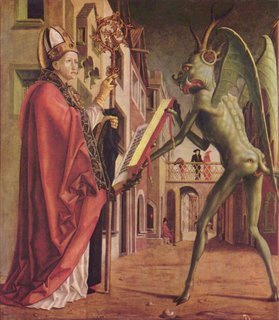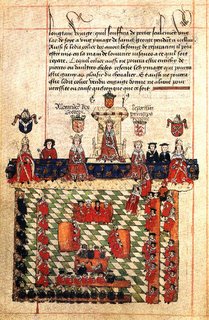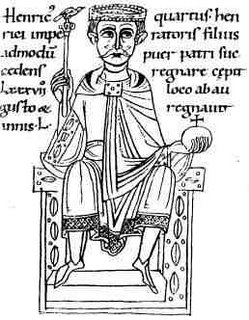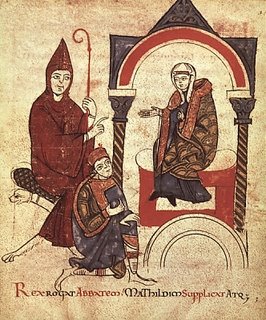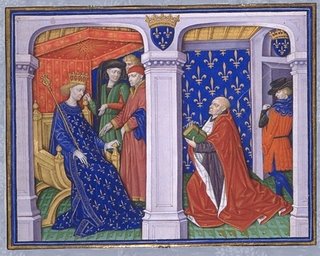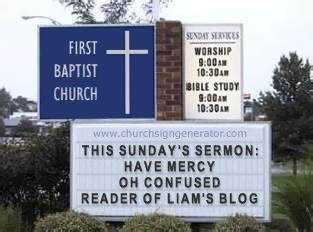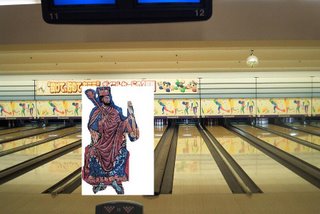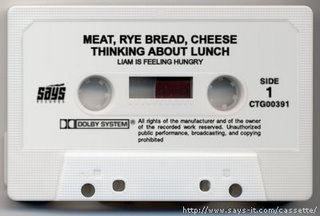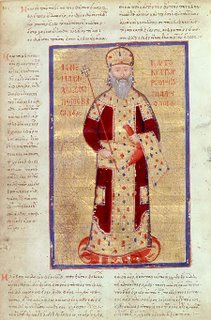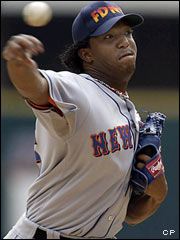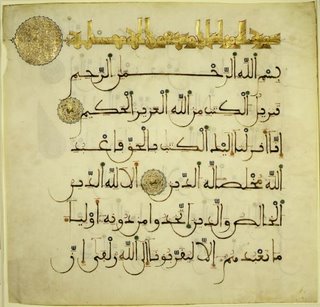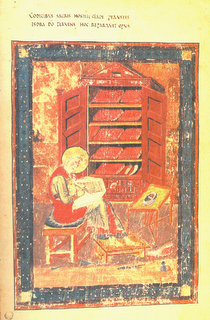 St. Helena finding the True Cross
St. Helena finding the True Cross.
Today is the feast of the
Triumph of the Cross. From the Franciscans at americancatholic.org:
Early in the fourth century St. Helena, mother of the Roman Emperor Constantine, went to Jerusalem in search of the holy places of Christ's life. She razed the Temple of Aphrodite, which tradition held was built over the Savior's tomb, and her son built the Basilica of the Holy Sepulcher over the tomb. During the excavation, workers found three crosses. Legend has it that the one on which Jesus died was identified when its touch healed a dying woman.The cross immediately became an object of veneration. At a Good Friday celebration in Jerusalem toward the end of the fourth century, according to an eyewitness, the wood was taken out of its silver container and placed on a table together with the inscription Pilate ordered placed above Jesus' head: Then "all the people pass through one by one; all of them bow down, touching the cross and the inscription, first with their foreheads, then with their eyes; and, after kissing the cross, they move on."
To this day the Eastern Churches, Catholic and Orthodox alike, celebrate the Exaltation of the Holy Cross on the September anniversary of the basilica's dedication. The feast entered the Western calendar in the seventh century after Emperor Heraclius recovered the cross from the Persians, who had carried it off in 614, 15 years earlier. According to the story, the emperor intended to carry the cross back into Jerusalem himself, but was unable to move forward until he took off his imperial garb and became a barefoot pilgrim.
Many stories grew up around the cross and its origin that connected the physical origin of its wood with its spiritual meaning. It was thought by some to come from the tree of knowledge of good and evil in the Garden of Eden. According to some legends, the tree from which the cross was made grew from Adam's grave, or even from his mouth (remember that the hill of crucifixion, Golgatha, the place of the skull, was thought to be so called because it was where Adam's skull was buried -- uniting the old Adam with the new Adam, the Fall with redemption). Various stories connect the tree with different Old Testament figures such as Seth, Lot, and Solomon. You can find Caxton's translation of the
Golden Legend story
here, and a description of the cycle by Piero della Francesca in Arezzo
here.
There is a beautiful and imposing medieval Greek
Monastery of the Cross near Jerusalem, which I visited in 2000. It was across an olive tree-filled valley from the Israel Museum, and I remember walking through the valley, entering the monastery's tiny gate, and being mobbed by a tour group of ecstatically devout elderly Greek pilgrims who had no doubt about the veracity of the legend which located the exact spot where the tree had grown inside the monastery.
 The Monastery of the Cross, Israel
The Monastery of the Cross, Israel.
What happened to the cross that St Helena discovered and Heraclius rescued from the Persians? Like many relics, both bodies and objects, it has been broken into countless pieces and dispersed through the world. One sliver of it was given to our family by the Jesuit godfather of
Filius imperatricis pulcherrima Africae occidentalis on the occasion of the latter's First Communion. We don't know about its provenance, and yes, perhaps it's not really a sliver of the True Cross.

Then again, perhaps it is. It was a wonderful gift and often with relics and holy sites, the faith you put into them as symbols is as important as the facts involved on the ground. We know there was a Holy Cross, we know this is a sliver. The rest is faith.
Our relic of the Holy Cross. The tiny reliquary is about the size of a nickel, the sliver of the Holy Cross lay on top of the white embroidered cross in the case.
I'd like to leave you with a hymn composed by the great Latin poet Venantius Fortunatus (AD 530-609) which is often sung on this feast day. I will leave it in Latin, but if you must, you can find one of many English translations
here.
Hymnus in Honore Sanctae Crucis
Vexilla regis prodeunt,
fulget crucis mysterium,
quo carne carnis conditor
suspensus est patibulo.
Confixa clavis viscera
tendens manus, vestigia
redemptionis gratia
hic inmolata est hostia.
Quo vulneratus insuper
mucrone diro lanceae,
ut nos lavaret crimine,
manavit unda et sanguine.
Inpleta sunt quae concinit
David fideli carmine,
dicendo nationibus:
regnavit a ligno deus.
Arbor decora et fulgida,
ornata regis purpura,
electa, digno stipite
tam sancta membra tangere!
Beata cuius brachiis
pretium pependit saeculi!
statera facta est corporis
praedam tulitque Tartari.
Fundis aroma cortice,
vincis sapore nectare,
iucunda fructu fertili
plaudis triumpho nobili.
Salve ara, salve victima
de passionis gloria,
qua vita mortem pertulit
et morte vitam reddidit.
 The Angel appears to the shepherds, San Isisdoro, Leon, Spain
The Angel appears to the shepherds, San Isisdoro, Leon, Spain





